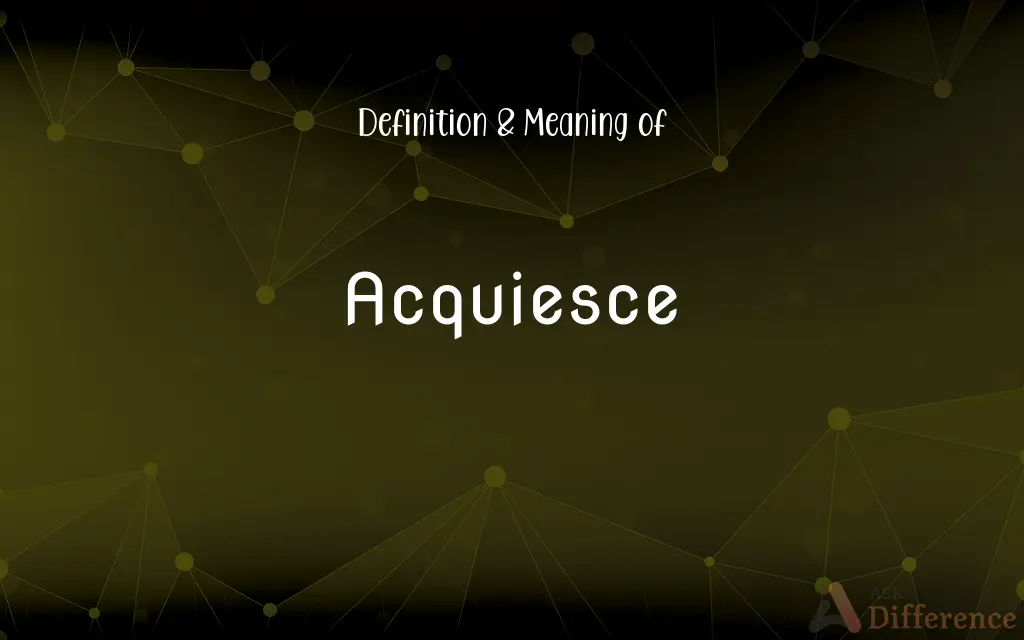Acquiesce Definition and Meaning
By Tayyaba Rehman & Urooj Arif — Published on May 19, 2024
Acquiesce means to accept something reluctantly but without protest. e.g., After a lengthy debate, she decided to acquiesce to their demands.

Table of Contents
Acquiesce Definitions
To agree or express agreement passively or without resistance.
He decided to acquiesce in the face of overwhelming opposition.
To comply with or submit to someone's wishes or demands silently.
The employees acquiesced to the new policy changes.
To give in or consent quietly without protesting.
They acquiesced to the terms to avoid further conflict.
To accept something without enthusiasm but with a resigned attitude.
After much deliberation, they chose to acquiesce.
To let oneself be carried along by the wishes or decisions of others.
He acquiesced, feeling too tired to argue.
To accept something reluctantly but without protest.
She eventually acquiesced to the unavoidable circumstances.
To agree tacitly or without overt expression.
By not responding, he seemed to acquiesce to the proposal.
To consent or comply passively or without protest
"The newest protocols require that the subjects of research ... acquiesce to the ultimate objectives" (Steve Olson). "Socrates acquiesced in his own execution" (William H. Gass).
To rest satisfied, or apparently satisfied, or to rest without opposition and discontent (usually implying previous opposition or discontent); to accept or consent by silence or by omitting to object.
(intransitive) To concur upon conviction; to assent to; usually, to concur, not heartily but so far as to forbear opposition.
To acquiesce in an opinion
To rest satisfied, or apparently satisfied, or to rest without opposition and discontent (usually implying previous opposition or discontent); to accept or consent by silence or by omitting to object; - followed by in, formerly also by with and to.
They were compelled to acquiesce in a government which they did not regard as just.
To concur upon conviction; as, to acquiesce in an opinion; to assent to; usually, to concur, not heartily but so far as to forbear opposition.
To agree or express agreement;
The Maestro assented to the request for an encore
To yield or surrender to another’s decision or authority without objection.
The minority acquiesced in the decision of the majority.
To conform to another’s wishes in a submissive manner.
They acquiesced in the hope of achieving peace.
To assent implicitly by one's actions or inaction.
Her silence was taken as an acquiescence to the plan.
Acquiesce Snonyms
Comply
To act in accordance with a wish or command.
They complied with the regulations.
Agree
To have the same opinion about something; concur.
They agreed on the terms of the settlement.
Yield
To give way to arguments, demands, or pressure.
The city yielded to the demands of the protesters.
Submit
To accept or yield to a superior force or to the authority or will of another person.
He submitted to the inevitable.
Accede
To agree to a request or a demand.
The board acceded to his request for more funding.
Capitulate
To cease to resist an opponent or an unwelcome demand; surrender.
The government was forced to capitulate.
Concede
To admit that something is true or valid after first denying or resisting it.
She conceded that the project needed more time.
Assent
To express approval or agreement.
The committee assented to the proposal.
Consent
To give permission for something to happen.
She finally consented to the interview.
Succumb
To fail to resist pressure, temptation, or some other negative force.
He succumbed to the temptation.
Acquiesce Example Sentences
They had no choice but to acquiesce in the face of superior forces.
After much persuasion, he began to acquiesce to the idea.
Despite initial resistance, the council voted to acquiesce to the developer's plans.
Her decision to acquiesce was seen as a sign of weakness by her peers.
She would rather acquiesce than face a prolonged legal battle.
The company will have to acquiesce to the new environmental standards.
They hoped he would acquiesce once he understood the benefits.
Governments sometimes need to acquiesce to public opinion.
Rather than continue the argument, I chose to acquiesce for the sake of peace.
The family had to acquiesce to the doctor's recommendations.
Common Curiosities
How do we divide acquiesce into syllables?
Acquiesce is divided into syllables as ac-qui-esce.
How many syllables are in acquiesce?
There are three syllables in acquiesce.
Why is it called acquiesce?
Acquiesce is called so from the Latin "acquiēscere," meaning to find rest in, which combines "ad-" (toward) and "quiēscere" (to rest). It implies agreeing or consenting to something passively or without protest.
What is a stressed syllable in acquiesce?
The stressed syllable in acquiesce is the second one, "qui."
What is the first form of acquiesce?
The first form of acquiesce is acquiesce itself.
How is acquiesce used in a sentence?
Acquiesce is used to describe the act of agreeing or consenting to something passively or without protest. e.g., After much debate, they decided to acquiesce to the terms offered.
What is the pronunciation of acquiesce?
Acquiesce is pronounced as /ˌæk.wiˈɛs/.
What is the root word of acquiesce?
The root word of acquiesce is the Latin "acquiēscere."
What is the singular form of acquiesce?
Acquiesce does not have a singular form as it is a verb, not a noun.
What is the verb form of acquiesce?
Acquiesce itself is a verb.
What is the plural form of acquiesce?
As a verb, acquiesce does not have a plural form.
Is acquiesce an abstract noun?
No, acquiesce is a verb, not a noun.
Which vowel is used before acquiesce?
The vowel "a" is used at the beginning of acquiesce.
What part of speech is acquiesce?
Acquiesce is a verb.
Is acquiesce a vowel or consonant?
The term acquiesce starts with a vowel letter 'A'.
Is the acquiesce term a metaphor?
No, acquiesce is not typically used as a metaphor.
Which conjunction is used with acquiesce?
Conjunctions such as "and" or "but" can be used with acquiesce, depending on sentence structure.
Is acquiesce a noun or adjective?
Acquiesce is a verb.
Is acquiesce an adverb?
No, acquiesce is not an adverb.
Is acquiesce a negative or positive word?
Acquiesce is neutral; its positive or negative connotation depends on the context.
Is acquiesce a countable noun?
No, acquiesce is not a noun; it's a verb.
Is the word acquiesce Gerund?
No, acquiesce is not a gerund; however, "acquiescing" would be the gerund form.
Is the word “acquiesce” a Direct object or an Indirect object?
The word “acquiesce” is neither; it is a verb. Its use determines whether it affects a direct or indirect object in a sentence.
Which determiner is used with acquiesce?
Determiners are not typically used with verbs like acquiesce.
Which preposition is used with acquiesce?
The preposition "to" is commonly used with acquiesce, as in "acquiesce to a request."
Which article is used with acquiesce?
Articles are not used with acquiesce as it is a verb, not a noun.
What is another term for acquiesce?
Another term for acquiesce is "consent."
What is the opposite of acquiesce?
The opposite of acquiesce is "resist" or "refuse."
Is acquiesce a collective noun?
No, acquiesce is not a collective noun.
Is the word acquiesce imperative?
Acquiesce can be used in an imperative mood when giving a command or request to consent.
Share Your Discovery

Previous Term
Quantise Definition and Meaning
Next Term
Buggy Definition and MeaningAuthor Spotlight
Written by
Tayyaba RehmanTayyaba Rehman is a distinguished writer, currently serving as a primary contributor to askdifference.com. As a researcher in semantics and etymology, Tayyaba's passion for the complexity of languages and their distinctions has found a perfect home on the platform. Tayyaba delves into the intricacies of language, distinguishing between commonly confused words and phrases, thereby providing clarity for readers worldwide.
Co-written by
Urooj ArifUrooj is a skilled content writer at Ask Difference, known for her exceptional ability to simplify complex topics into engaging and informative content. With a passion for research and a flair for clear, concise writing, she consistently delivers articles that resonate with our diverse audience.



































